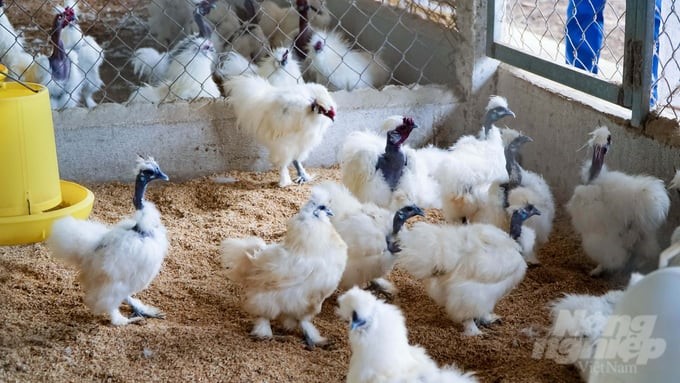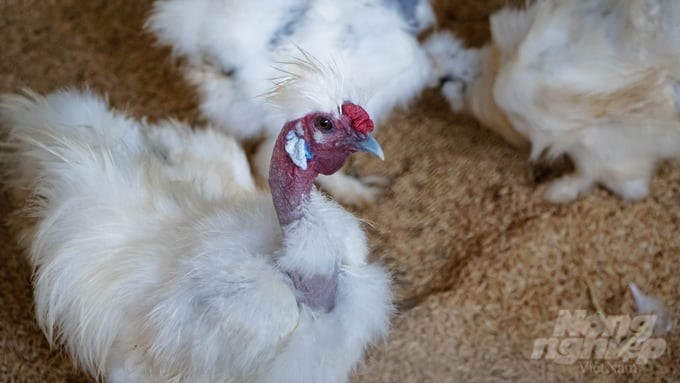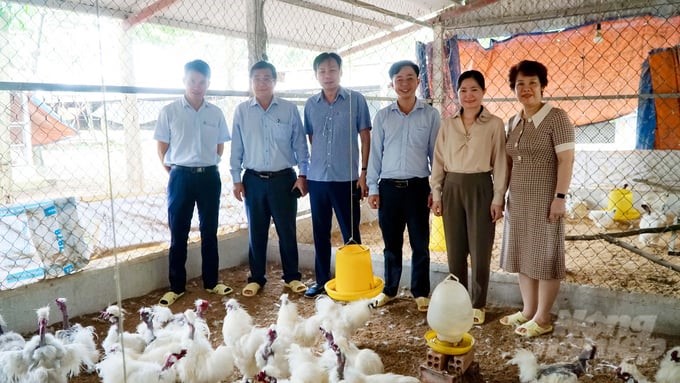November 26, 2025 | 07:12 GMT +7
November 26, 2025 | 07:12 GMT +7
Hotline: 0913.378.918
November 26, 2025 | 07:12 GMT +7
Hotline: 0913.378.918

Ma Da chicken is an indigenous variety being preserved by the Vigova Center and is almost no longer raised in farmer households. Photo: Le Binh.
During our visit to the Vigova Poultry Research and Development Center (Vigova Center, for short), we were quite impressed with the image of the indigenous Ma Da chicken with white feathers and black skin. If not introduced in advance, many people will certainly mistake this for some species of bird.
According to Dr. Hoang Tuan Thanh, Director of Vigova Center, the Ma Da chicken variety was discovered and has been undergoing genetic conservation since 2018. This is an indigenous chicken variety in Vinh Cuu district, Dong Nai province, and is rarely raised in farmer households.
It is alarming that this precious chicken variety is in danger of extinction. Realizing the precious genetic resource that has great potential for development, the Vigova Center has asked local people for permission to buy back the parent breed resources and conduct research for conservation.
“Ma Da chicken is a domestic chicken variety that has a beautiful appearance, is very easy to raise, has delicious meat and egg quality, is less susceptible to disease, and adapts well to ecological conditions. This is one of the precious poultry genetic resources that needs in-depth research to preserve," said Dr. Hoang Tuan Thanh.
Following the leaders and staff of Vigova Center, reporters of the Vietnam Agriculture Newspaper saw firsthand and interacted with the Ma Da chicken flock in Trang Bom district (Dong Nai province). On the smallholding farm under Vigova Center, there are more than 200 Ma Da chickens being raised and researched.
Ma Da chicken has characteristics of white feathers all over the body, and most of the feathers on the neck, wing roots, and thighs are all bald. In addition, the skin, legs, and beak are all black. This is a medicinal chicken variety with extremely high nutritional value. Therefore, this is a chicken variety that has great economic potential and creates a highlight for smallholding farming in Dong Nai.

With their unique shape, Ma Da chickens can be both raised as pets and sold as specialty meat with high economic value. Photo: Le Binh.
After many years of preserving Ma Da chickens, Mr. Tran Van Dung, owner of a poultry farming facility, said that this is a livestock that consumes very little food and has good disease resistance. “An adult chicken only consumes about 30 grams of food per day, 1/3 less than other chicken species. As for disease epidemics, it seems that they are rarely susceptible to common diseases," said Mr. Dung.
Deriving from raising and preserving the precious indigenous chicken genetic resource of Dong Nai, Vigova Center hopes to replicate the Ma Da chicken raising model in the community. Preserving the precious chicken variety associated with bringing economic benefits to local people is what Vigova is aiming for.
“Raising Ma Da chickens on a large scale in farmer households not only helps preserve the genetic resources of the Ma Da chicken variety and maintain biodiversity but also contributes to social welfare and improves the livelihoods of local people. We expect this to be one of Dong Nai's typical OCOP products," Dr. Hoang Tuan Thanh shared.

Representatives of the Dong Nai Department of Agriculture and Rural Development, Trang Bom district, and Vigova Center are promoting to soon bring Ma Da chickens to be widely raised in farmer households. Photo: Le Binh.
In the near future, Ma Da chickens can be raised on a large scale in Dong Nai in two ways: raising pets or selling commercial chickens for meat.
Mr. Nguyen Chi Hien, Director of Dong Nai Agricultural Services Center, also has great expectations for the Ma Da chicken variety, which seemed to have been extinct for a long time. This is a livestock variety with a lot of potential to develop a smallholding farming model with high economic value.
“For sustainable development, we have instructed the Vigova Center side to conduct scientific research, register trademarks, and trace product origins. At the same time, as suggested, Ma Da chicken will also be registered as a typical OCOP product of Dong Nai. Hopefully, in the near future, Ma Da chicken will be widely raised and sold to the market soon," Mr. Nguyen Chi Hien shared.
Translated by Huyen Vu Thu
/2025/11/25/0045-1-135246_13.jpg)
(VAN) Ca Mau is researching a model of sea-encroaching embankments combined with viaducts and logistics service zones, aiming both to prevent erosion and create land funds for marine economic development.

(VAN) The information was shared at the seminar 'Urban Agriculture - Solutions for Developing Green Spaces,' organized by the Kinh te & Do thi Newspaper and the Biotechnology Center of Ho Chi Minh City.
/2025/11/19/4141-2-132831_216.jpg)
(VAN) One of Japfa's outstanding solutions is implementing digital transformation and artificial intelligence (AI) to optimize operations, enhance productivity, and advance sustainable development.
/2025/11/19/4847-1-093540_448.jpg)
(VAN) The Gia Lai Provincial People’s Committee had a working session with the delegation of the U.S. Department of Agriculture, the State of Idaho, and representatives of the State's leading enterprises.

(VAN) Ca Mau has a sufficient foundation to become a strong regional aquaculture center, where production integrates the economy, the environment, and the lives of the people.

(VAN) SEIKI Group envisions itself as a pioneer in the ‘dual transformation’ of digital technology and green industry, standing alongside the Government and Vietnamese businesses in their pursuit of sustainable development.

(VAN) The VNGEONET network affirms Viet Nam's progress in mastering digital space, providing a precise positioning data platform to serve socioeconomic development.